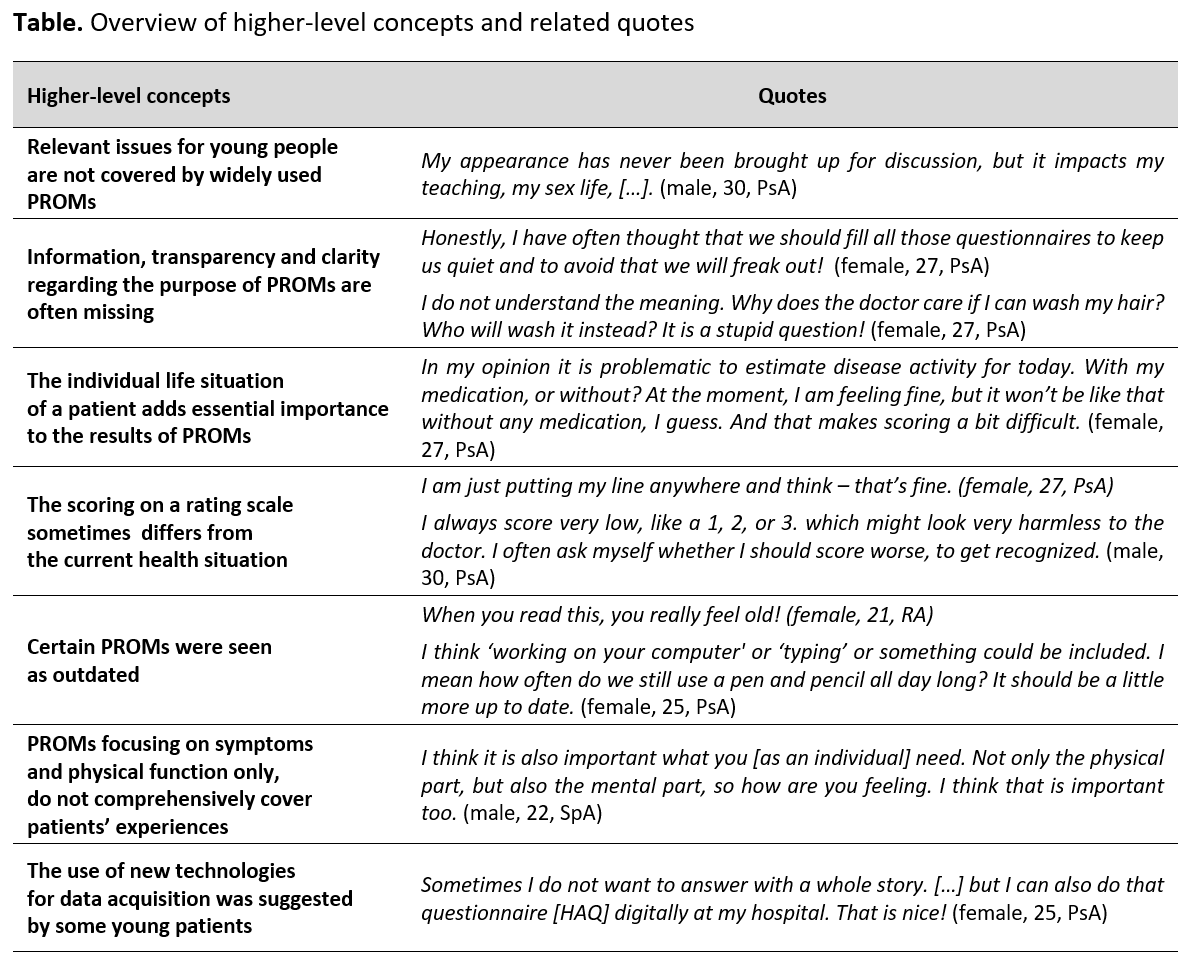Session Information
Session Type: ARP Abstract Session
Session Time: 2:30PM-4:00PM
Background/Purpose: Although patient-reported outcome measures (PROMs) are extensively used in clinical practice and research, it is unclear whether the most commonly used instruments adequately cover the perspective of young people with chronic inflammatory arthritis. This study was undertaken to investigate whether the aspects important to young people with inflammatory arthritis are sufficiently covered by the PROMs that are widely used in clinical practice and research.
Methods: A qualitative, multicentre focus group interview study was conducted in Austria, Croatia, Italy and the Netherlands in order to inform a EULAR-funded taskforce. Three groups of young people (aged 18-35 years) with either (1) rheumatoid arthritis (RA), juvenile idiopathic arthritis (JIA) and Still’s disease, (2) psoriatic arthritis (PsA), or (3) axial spondyloarthritis (SpA) were interviewed at each centre. The interview guide was based on the WHO International Classification of Functioning, Disability and Health (ICF) to comprehensively cover all aspects of functioning in daily life [1]. It also included questions on the perspectives and views of the participants on selected PROMs (Pain scales, Patient Global Assessment [PGA], FACIT Fatigue Scale, The Health Assessment Questionnaire [HAQ]/Bath Ankylosing Spondylitis Functional Index [BASFI], and The 36-Item Short Form Health Survey [SF-36]). All interviews were conducted by trained local investigators, audio-recorded, transcribed verbatim, and analysed using a modified form of ‘meaning condensation’ [2]. During a face-to-face meeting of the task-force members, the concepts were reformulated and organized into a scheme of higher and lower-level concepts.
Results: Thematic saturation was reached after 12 focus groups with 53 participants (21 with RA/JIA/Still’s, 15 with SpA, 17 with PsA; 72% female, mean age 28, SD±5), resulting in 18 hours and 22 minutes of recorded time and 269 pages of transcript. The analysis revealed aspects of functioning in daily life important to young people with inflammatory arthritis which were mentioned in all countries. Furthermore, 55 concepts emerged with regard to PROMs and were summarized into seven higher-level concepts. The table depicts these higher-level concepts including quotes from the interviews.
Conclusion: The evaluation of young patients’ perspectives should probably reach beyond the topics/aspects covered in the most commonly used PROMs. Accordingly, tailoring the assessments to specific needs of young people should be considered.
References:
- WHO, International classification of functioning, disability and health: ICF. 2001: Geneva: World Health Organization.
- Stamm, T.A., et al., Concepts of functioning and health important to people with systemic sclerosis: a qualitative study in four European countries. Ann Rheum Dis, 2011. 70(6): p. 1074-9.
To cite this abstract in AMA style:
Mosor E, Studenic P, Alunno A, Padjen I, Olsder W, Ramiro S, Bini I, Caeyers N, Gossec L, Kouloumas M, Nikiphorou E, Stones S, Wilhelmer T, Stamm T. “When You Read This, You Really Feel Old!” Perspectives of Young People with Inflammatory Arthritis on Patient Reported Outcome Measures from a European Qualitative Study [abstract]. Arthritis Rheumatol. 2019; 71 (suppl 10). https://acrabstracts.org/abstract/when-you-read-this-you-really-feel-old-perspectives-of-young-people-with-inflammatory-arthritis-on-patient-reported-outcome-measures-from-a-european-qualitative-study/. Accessed .« Back to 2019 ACR/ARP Annual Meeting
ACR Meeting Abstracts - https://acrabstracts.org/abstract/when-you-read-this-you-really-feel-old-perspectives-of-young-people-with-inflammatory-arthritis-on-patient-reported-outcome-measures-from-a-european-qualitative-study/

